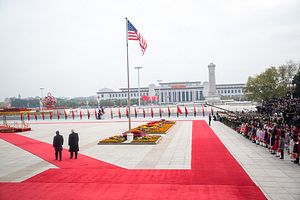An interesting new report from the New American Cyber-Security Initiative suggests that China is stepping up its efforts to protect its own intellectual property (IP) on the export market. In particular, China has set forth steps to monitor and limit the export of IP related to plant varieties, software, and integrated circuits, on the argument that these fields are critical to national and economic security. This development is in line with increasing Chinese concerns about domestically produced IP finding its way out of the country. The Russian government has expressed similar concerns, making up for its lack of domestic IP expertise by providing funds for export-oriented Russian companies to hire foreign law firms specializing in IP protection.
In short, there is very little that is cultural about either the U.S. or the Chinese approaches to IP protection, and very much that is positional. States that have advanced IP to protect tend to want to protect it; states that don’t tend to be lax about protection, especially as regards foreign IP.
To review: The United States government believes that IP protection is critical to both the physical and economic security of the country. IP protection ensures that American businesses, which produce a disproportionate percentage of their value in IP, will remain competitive on the international market. The U.S. government also believes that advanced technology is critical to U.S. military superiority, and that protecting this technology (through IP law and other means) will keep the United States ahead.
Until quite recently, China has assessed the terrain quite differently. Like the United States at certain times in the past, China has sought to appropriate foreign IP by whatever means necessary. This has allowed Chinese businesses to catch up with their foreign counterparts. On the security side, the acquisition of foreign technologies has allowed China to leap ahead in the sophistication of its own designs and manufacturing processes.
But broadly speaking, both countries are positioned as they should be with respect to their approach to IP law. China has updated and tightened its own rules because its economy has grown more technologically competitive, because Chinese business need to have a legal basis to trade technology with foreign companies, and because of U.S. pressure. The Chinese government, although authoritarian, has constituencies that it must satisfy, and some of these constituencies are quite interested in tighter legal protection for their intellectual property, both inside and outside the country. This is why domestic IP protection in China has increased substantially in the past decade.
The question is how China will approach the growing body of international IP regulation. China has argued in multilateral fora that U.S. actions exceed legitimate sanctions on China’s actions. Indeed, the relevance of security factors in U.S. decision-making (evidence by the DiUX report) implies that the U.S. is unwilling to rely on international law for the protection of critical military technologies. In a sense, China is making a more internationalized argument on IP than the United States, which represents a major shift from previous years.
It’s also worth noting that the Trump administration’s sudden interest in reigniting the Trans-Pacific Partnership (TPP) may have to do with its growing appreciation of the vulnerability of U.S. IP. The TPP included rigorous procedures for the protection of U.S. IP, procedures that have been watered down in follow-on treaty negotiations since the United States withdrew. The Obama administration viewed the IP protection procedures set forth in the TPP as central to its appeal, an appeal that was temporarily lost on the Trump administration. It remains to be seen whether Trump’s newfound concern about IP will translate into further multilateral action.

































